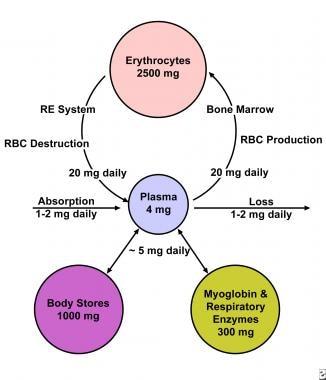In the realm of our bustling lives, amidst the kaleidoscope of nutrients vying for attention, one mighty mineral quietly stands its ground, endeavoring to safeguard our blood health – Iron. From the depths of ancient times to the present day, this unassuming yet indispensable element has forged an unbreakable bond with our well-being. As we embark on a journey into the captivating world of iron intake and its profound significance, let us unravel the secrets that lie within, and unveil the remarkable tale of iron’s unwavering commitment to our vitality. Pulsating with creativity, our exploration will be guided by a neutral perspective, embracing the very essence of iron’s importance for blood health. So let us embark on this enlightening quest, where science and wonder converge, leaving no hemoglobin molecule unturned, as we delve deep into the enchanting realm of understanding iron intake.
Iron Intake: Understanding the Importance for Blood Health
Iron is a vital nutrient that plays a crucial role in maintaining the overall health of our blood. It is essential for the production of hemoglobin, the protein in red blood cells that carries oxygen from the lungs to all parts of the body. Without adequate iron intake, our blood cells would be unable to transport oxygen efficiently, leading to a range of health issues.
One key reason why iron intake is important for blood health is its involvement in preventing iron deficiency anemia. This condition occurs when the body lacks sufficient iron to produce an adequate amount of healthy red blood cells. Symptoms of iron deficiency anemia include fatigue, weakness, shortness of breath, dizziness, and even cognitive impairment. Consuming foods rich in iron, such as lean meats, legumes, dark leafy greens, and fortified cereals, can help ensure that our bodies have the necessary iron stores to produce healthy red blood cells.
It is worth noting that not all iron is created equal. The body absorbs two types of dietary iron: heme iron (found in animal products) and non-heme iron (found in plant-based foods). Heme iron is more easily absorbed by the body compared to non-heme iron. To enhance the absorption of non-heme iron, it is beneficial to consume it with vitamin C-rich foods, such as oranges or bell peppers. Additionally, pairing iron-rich foods with foods that contain high levels of vitamin A (like carrots or sweet potatoes) can also improve iron absorption. By being mindful of our iron intake and considering various dietary combinations, we can ensure that our blood remains in optimal health.
The Crucial Role of Iron in Maintaining Healthy Blood Cells
Iron is an essential mineral that plays a crucial role in our overall well-being, especially when it comes to maintaining healthy blood cells. Without an adequate amount of iron in our diet, our blood cells cannot carry out their important functions effectively. Iron is an integral part of hemoglobin, a protein responsible for transporting oxygen from the lungs to the rest of the body. This vital process ensures that our cells receive the oxygen they need to produce energy and perform their functions optimally.
In addition to its oxygen-carrying capabilities, iron is also involved in the production of red blood cells. These cells are responsible for carrying oxygen, as well as removing carbon dioxide from the body. It is clear that without sufficient iron, the production of healthy red blood cells would be hindered, leading to decreased oxygen delivery and potential health issues.
To ensure that your iron intake meets the recommended daily amount, it is crucial to incorporate iron-rich foods into your diet. Some excellent natural sources of iron include lean red meat, poultry, fish, lentils, spinach, and fortified cereals. Pairing these iron-rich foods with vitamin C-rich foods, such as citrus fruits or bell peppers, can enhance iron absorption. However, it is essential to speak with a healthcare professional before making any significant dietary changes or starting iron supplements, as excessive iron intake can also have adverse effects on the body.
To summarize, iron intake plays a significant role in maintaining healthy blood cells and ensuring the proper functioning of our bodies. By incorporating iron-rich foods into our diet and seeking professional advice if needed, we can support our blood health and overall well-being. Remember, a balanced and varied diet is key to providing the body with the necessary nutrients, including iron, for optimum health.
Unveiling the Impact of Iron Deficiency on Overall Wellbeing
Iron is an essential nutrient that plays a crucial role in maintaining blood health and overall wellbeing. The impact of iron deficiency on our bodies cannot be overstated, as it can lead to a range of health problems. From feeling tired and lethargic to experiencing shortness of breath and difficulty concentrating, the effects of iron deficiency can be both physical and mental.
One of the primary functions of iron is to help transport oxygen throughout our bodies. Without adequate iron levels, our blood cannot efficiently carry oxygen to our organs and tissues, resulting in fatigue and decreased energy levels. Iron is also necessary for the production of red blood cells, which are responsible for carrying oxygen to our cells. When we don’t have enough iron, our body struggles to produce enough red blood cells, leading to anemia.
Maintaining proper iron intake is vital for preventing iron deficiency and supporting blood health. Including iron-rich foods in our diet, such as lean meats, poultry, fish, leafy green vegetables, and legumes, can help ensure we meet our daily iron requirements. Additionally, consuming foods rich in vitamin C can enhance iron absorption. However, in some cases, dietary changes may not be enough, and iron supplements may be necessary. It’s important to consult with a healthcare professional to determine the best approach for maintaining adequate iron levels and promoting overall wellbeing.
In summary, understanding the importance of iron intake for blood health is essential for our overall wellbeing. Iron deficiency can have a significant impact on our bodies, ranging from physical symptoms like fatigue to mental challenges such as difficulty concentrating. By prioritizing iron-rich foods and considering supplements if needed, we can support our blood health and ensure our body has the necessary resources for optimal functioning. Remember, your health is paramount, so take steps to unveil the impact of iron deficiency and prioritize iron intake for a healthier you.
Expert Tips: How to Boost Iron Intake and Optimize Blood Health
An essential mineral for our bodies to function properly, iron plays a crucial role in blood health. Without enough iron, our bodies may struggle to produce enough red blood cells, leading to symptoms such as fatigue, dizziness, and shortness of breath. Understanding the importance of iron intake is the first step in ensuring our blood remains healthy and oxygen can efficiently be transported throughout our bodies.
Here are some expert tips to help you boost your iron intake and optimize your blood health:
- Include iron-rich foods in your diet: Incorporate sources of iron, such as lean red meat, poultry, seafood, beans, lentils, spinach, and fortified cereals, into your meals. These foods are not only delicious but also great natural sources of iron.
- Pair iron-rich foods with vitamin C: Enhance iron absorption by combining it with foods high in vitamin C, such as oranges, strawberries, tomatoes, and bell peppers. For example, squeeze some lemon juice over your iron-rich spinach salad to maximize its nutritional benefits.
- Avoid consuming iron inhibitors: Certain substances, like caffeine and calcium-rich foods, can hinder iron absorption. Try to limit your intake of these inhibitors and separate them from iron-rich meals or supplements to ensure optimal absorption.
- Consider taking iron supplements: If you struggle to meet your iron needs through diet alone, consult with a healthcare professional who can recommend and guide you on iron supplements that suit your specific requirements.
| Iron-Rich Foods: | Recommended Daily Intake: |
| Lean Red Meat (beef, lamb, pork) | 3-4 servings (serving size: 3 oz) |
| Poultry (chicken, turkey) | 2-3 servings (serving size: 3 oz) |
| Seafood (oysters, clams, tuna) | 2-3 servings (serving size: 3 oz) |
| Beans and Lentils | 2-3 servings (serving size: ¾ cup) |
| Spinach | 1-2 servings (serving size: ½ cup cooked) |
| Fortified Cereals | 1 serving (follow package instructions) |
Remember, maintaining an adequate iron intake is essential for optimizing your blood health. By following these expert tips and incorporating iron-rich foods into your diet, you can ensure your body receives the necessary iron it needs to support healthy blood production and overall well-being.
In Summary
As we bid adieu to this exploration into the world of iron intake and its vital role in maintaining our blood health, we can’t help but feel a renewed appreciation for the magnificent intricacies of our bodies. From the humdrum routine of our daily lives to the tumultuous leaps of scientific breakthroughs, the significance of iron in our bloodstream often goes unnoticed, hidden within the whispers of our cells.
Amidst the cacophony of this complex symphony that is our body, iron stands tall as the steadfast conductor, orchestrating an ensemble of red blood cells harmoniously carrying life-sustaining oxygen throughout our being. It is a true testament to the astonishing tapestry of existence.
Throughout our journey, we have dived deep into the ocean of knowledge, exploring the sources of iron, deciphering its absorption mysteries, and uncovering the indispensable function it plays in our wellbeing. It is through this endeavor that we have come to comprehend the paramount importance of maintaining optimal iron levels for a thriving bloodstream.
But, dear reader, as our fruitful exploration reaches its conclusion, let us not forget the profound impact our choices hold. With a gentle nod to impeccable nutrition, a waltz with iron-rich foods, and a twirl with mindful supplementation, we can embrace a symphony of crimson vitality. Let our awareness of iron intake be the diligent path towards a robust relationship with our precious life force.
So, here we part ways, armed with the knowledge that iron, the humble mineral, gracefully dances its way through our veins, nourishing our cells, and granting us the vibrancy to conquer the symphony of life. May this newfound understanding guide us towards a harmonious existence, where the rhythm of our blood echoes the heartbeat of the universe.
Farewell, dear reader, and may your journey towards optimum iron intake lead you to a symphony of unparalleled health and vitality.


